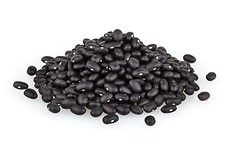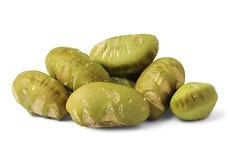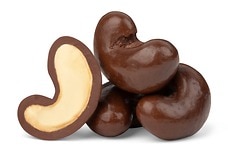Food & Snack Sources of Zinc
Zinc is an essential mineral that is added to some foods, present naturally in others, and available in supplement form. Zinc has been linked to a wide range of benefits that help keep the human body healthy with the majority of these centered around cellular metabolism. According to the National Institutes of Health ([NIH], 2016), zinc is involved in supporting the immune system and facilitating the healing of wounds among many other essential processes.
In fact, the presence of zinc is required to facilitate the activity of roughly 100 different enzymes in the body. It is necessary to ensure that the body can properly synthesize DNA and protein, and it aids in the process of cell division. Because the human body has no mechanism in which to store zinc, proper amounts must be consumed on a daily basis.
Foods That Contain Zinc
While oysters contain the most zinc by far of any other food – three ounces of cooked, breaded and fried oysters contain 74 milligrams of zinc compared to the same amount of braised chuck roast which contains only 7 milligrams – most Americans obtain the bulk of their zinc intake from poultry and red meat. Some other types of seafood – including lobster and crab – are good sources of zinc. Additional sources include: beans, dairy products, nuts and whole grains (NIH, 2016).
Phytates, which store the phosphorus that is present in plant- and grain-based foods, inhibit the body's effective absorption of zinc by binding it. This means the body cannot absorb the zinc in these foods as well as it can for those foods that are meat based. In spite of this, many plant- and grain-based foods, such as fortified breakfast cereal and oatmeal, are still ideal sources of zinc.
Zinc Health Complications
In most cases in which there is a deficiency in zinc, it is not readily apparent. Many of the symptoms that arise due to a lack of zinc, such as loss of appetite, frequent infections, growth retardation, diarrhea, mental lethargy and hair loss, can also be explained by other health conditions. A thorough medical examination is necessary in order to ascertain that a deficit in zinc is responsible (NIH, 2016).
Certain segments of the population, including pregnant and lactating women, vegetarians and those with gastrointestinal diseases, are more prone to be deficient in zinc. In some cases, supplementing with the mineral could be the ideal solution; however, caution must be exercised when using such supplements. Excessive amounts could cause vomiting, abdominal cramps and diarrhea within three to ten hours of taking the supplements (Wax, The Brooklyn Hospital Center, Zieve, Ogilive & A.D.A.M. Editorial team).
Recommended Recipes
The following recipes were selected based on the foods they utilize, such that each selection offers ingredients in quantities that act as viable sources of the mineral.
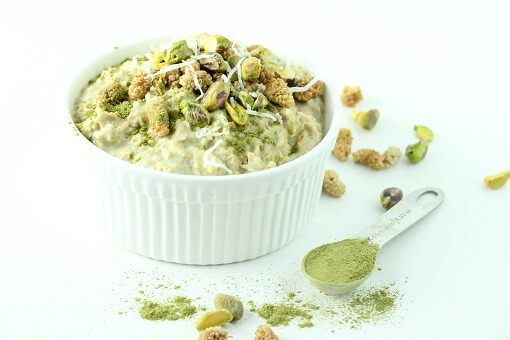
Moringa Oatmeal Recipe
A delicious way to start your day, this hot cereal supplies several potent sources of zinc, including an optional topping of chia seeds. Pistachios and mulberries provide trace amounts of the element, but the real sources are that of almond milk and chia seeds. Almond milk supplies 10% of the Daily Value (DV) for zinc and an ounce of chia seeds offers about 1 milligram of zinc- or roughly 15% of the DV for the mineral.
Ingredients: Gluten-free rolled oats, almond milk, agave or maple syrup, vanilla extract, moringa powder, pistachios, dried mulberries, unsweetened shredded coconut, chia seeds.
Total Time: 10 minutes
| Yield: 4 servings
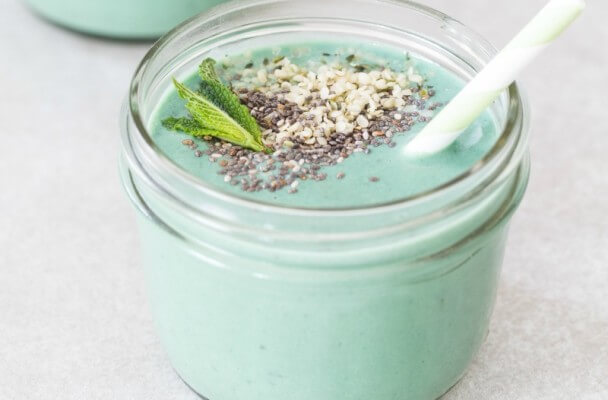
Protein-Packed Detox Smoothie Recipe {vegan}
Hemp hearts are an excellent source of zinc with each ounce providing 21% of the DV for the mineral. Almond milk, chia seeds, and hemp protein powder also provide sources of zinc, and each ingredient contributes to a concoction that is abundant in other nutrients as well, making it a well-balanced vegan source of protein, fiber, and essential vitamins and minerals.
Ingredients: Almond milk, frozen banana, spirulina, hemp protein powder (optional), fresh mint, chia seeds, hemp hearts.
Total Time: 5 minutes
| Yield: 2 servings
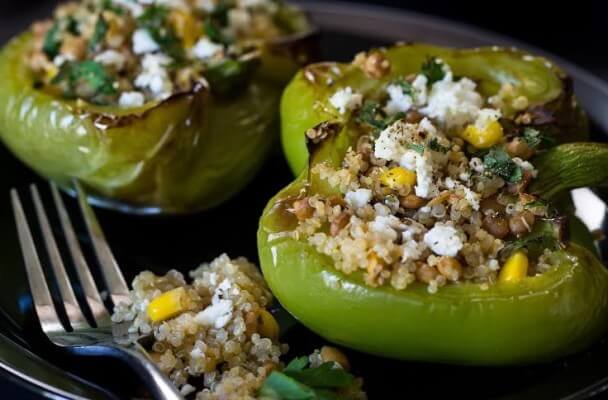
Quinoa Stuffed Peppers Recipe {gluten-free}
While bell peppers contain only trace elements of the mineral, each ingredient in this dish contributes to its moderate zinc content. Quinoa contains roughly 12% of the DV for zinc in a half cup serving, and spinach and lentils offer similarly impressive values. Additionally, each of these elements offers an abundance of other essential nutrients like protein, fiber, vitamins, and other minerals.
Ingredients: Quinoa, green bell peppers, canned lentils, fresh spinach, feta cheese, frozen corn (thawed), salt, black pepper.
Total Time: 40 minutes
| Yield: 6 servings (8 half-peppers)
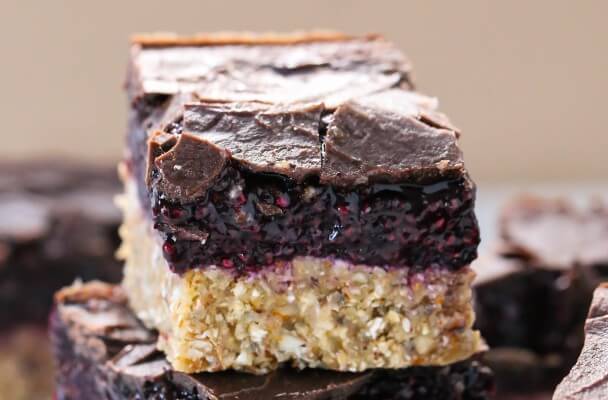
Blueberry Chia Jam Bars Recipe {gluten-free, vegan}
A dessert that supplies a surprising supplicant of zinc, these bars contain an ample amount of chia seeds and raw almonds, the latter of which offers 1.1 milligrams of the mineral in each quarter-cup. Similarly, a quarter cup of gluten-free rolled oats offers a whopping 14% of the DV for zinc!
Ingredients: Raw almonds, gluten-free rolled oats, chia seeds, maple syrup, water, vanilla or almond extract, blueberries, cacao powder, coconut oil.
Total Time: 30 minutes
| Yield: 16 mini bars
Healthy Snack Recommendations
Adding zinc to your diet is simple with the right selection of munchies filling your needs between meals. Enjoy these top treats for adding the mineral to your diet, courtesy of our Health Nut and Registered Dietitian!
Healthy Eating
- Healthy Highlights
- 5 Uses for Cacao Powder
- 5 Ways to Eat Farro
- 6 Best Gluten-Free Foods
- Alcohol and the Body
- Almond Flour Recipes
- Anti-Aging Superfoods
- Beat the Afternoon Slump
- Benefits of a Plant-Based Diet
- Benefits of Baobab
- Benefits of Cashews
- Benefits of Coconut Oil for Hair
- Benefits of Coconuts
- Benefits of Dates
- Benefits of Fenugreek
- Benefits of Garcinia Cambogia
- Benefits of Goji Berries
- Benefits of Kale Chips
- Benefits of Monk Fruit Sweetener
- Benefits of Peanuts
- Benefits of Pecans
- Benefits of Pistachios
- Benefits of Pumpkin Seeds
- Benefits of Spelt Flour
- Benefits of Steel Cut Oats
- Benefits of Sunflower Seeds
- Benefits of Tiger Nuts
- Benefits of Turmeric
- Benefits of Walnuts
- Benefits of Wheatgrass
- Best Food Fads
- Cacao vs Cocoa
- Caffeine-Free Energy Foods
- Chocolate That's Good for You
- Diet vs. Exercise
- Fat Burning Foods
- Food Myths Debunked
- Foods for Bone Density
- Foods for Colon Health
- Foods for Healthy Hair
- Foods for Healthy Skin
- Foods to Help Sleep
- Foods to Reduce Stress
- Green Tea Benefits
- Healthy Baking Flours
- Heart Healthy Habits
- High Protein Health Risks
- How to Boost Your Metabolism
- How to Lose Weight While Aging
- How to Throw a Vegan BBQ
- Kaniwa vs Quinoa
- Little Health Foods
- Low-Carb: Fad or Friend?
- Making Healthier Desserts
- Mediterranean Diet Meal Plan
- Natural Beauty Products
- Nuts for Weight Loss
- Preparing Vegan Meals
- Preventing Muscle Degeneration
- Rare Superfoods
- Reduce Sugar Intake
- Save Time By Going Vegan
- Smarter Snack Swaps
- Smoothie Ingredients
- Soy Protein vs Whey Protein
- Starting a Plant-Based Diet
- Steel Cut vs Rolled Oats
- Sugar Substitutes
- Vegan Proteins
- Vegan Substitutions for Fall Recipes
- Why Go Vegan
- Healthy Meals
- Healthy Recipes
- Sports Nutrition
- Nutrition and Special Diets
- 21 Day Fix
- 5 Popular Diet Similarities
- Alkaline Diet
- Anti-Inflammatory Diet
- Calorie Counting
- Carb Cycling Diet
- Celiac Disease
- Cholesterol
- Clean Eating
- Crohn's Disease
- DASH Diet
- Detox Diet
- Diabetes
- Diabetes Diet
- Diet Pill Dangers
- Fat Burning Foods
- Gluten-free Diet
- Glycemic Index
- Heart Health
- High Blood Pressure Diet
- High Fiber Foods
- How to Eat Healthy
- How to Lower Blood Pressure
- Hypertension
- IBS Diet
- Ketogenic Diet
- Liquid Diet
- Low GI Foods
- Low-Carb Diet and Foods
- Low-Fat High-Carb Diet
- Mediterranean Diet
- Mediterranean Diet Foods
- Military Diet
- Nutrition Labels Explained
- Paleo Diet
- Raw Food Diet
- Superfoods
- Sustainable Weight Loss
- Thrive Diet
- Vegan Diet
- Vegetarian Diet
- Weight Loss Shakes
- Whole30
- Vitamins, Minerals & Nutrients

